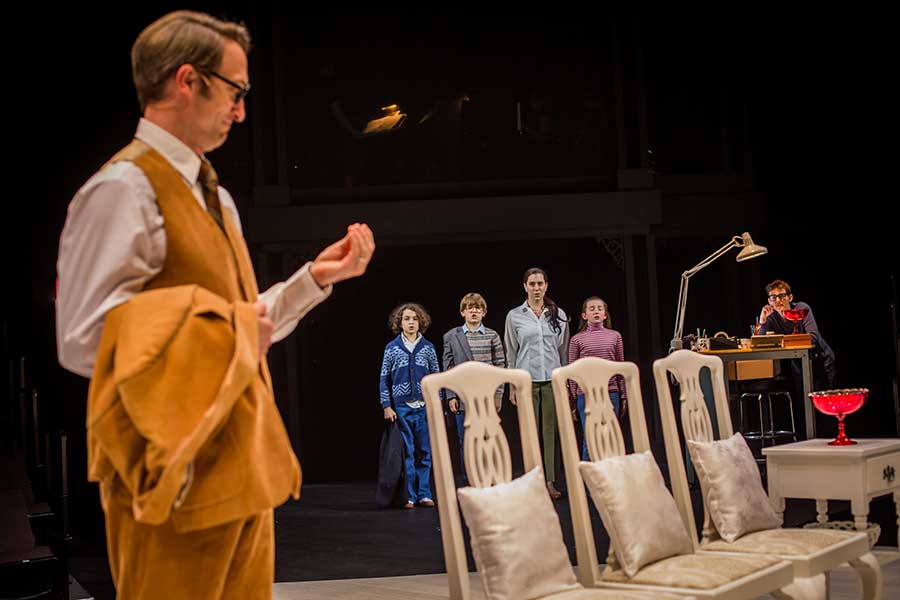In the theater, any all-day, all-night final rehearsal before previews would be fraught with emotion and wired energy. But for the cast and crew of the Arden’s “Fun Home” — a riveting, nonchronologically told musical with themes of hiding, discovery, coming out and tragically staying in — this particular Sunday was warmly hyperemotional, as it was Mother’s Day.
“Fun Home” is about a dysfunctional family at odds with one of its members (played at three distinct ages by Kate Bove, Izzy Castaldi and Mary Tuomanen) and the first pangs of lesbian love. It includes a deeply closeted father (Ben Dibble),and a mother (Kim Carson) coolly turning a blind eye. The show is based on the autobiographical graphic novel by Pennsylvania artist Alison Bechdel. Terrence J. Nolen directs.
“This is my ‘sad dad’ season,” said Dibble with a laugh about having recently played fractured fathers in “Next to Normal” and “Noises Off.” Along with a fatherly focus in 2018, Dibble finds “Fun Home” in a league with some of the darker roles he’s played, such as Lee Harvey Oswald in Sondheim’s “Assassins,” which was also at the Arden.
Dibble arrived at the rehearsal after a morning with his wife, teacher-director Amy Dugas Brown, and their three kids at the zoo. Dibble said it occurred to him that he yells at his children more than he realized. “I pride myself as a guy who leaves the bleak behind when home, but there’s a lot of emotional weight to ‘Fun House.’”
During rehearsal, the heavy lifting of the play found Dibble going from an intellectually driven, fussy dad to a man who wonders aloud whether he’s still attractive to the younger men he has in his sights.
“This show sticks with me when I leave the stage. That’s probably because, not only is it a family snapshot of Bechdel’s real life in the 1970s and 1980s, it also makes you realize how different things are now. My character created this complex world in order to hide from his truth.” Dibble said his character wouldn’t have to do that today. “The funny thing was hearing my real-life daughter — who is 9 and understands what gay is — asking me, ‘Why couldn’t he just be ‘out?’ In her world and the rest of this post-’Will & Grace’ generation, that’s nothing to hide. That’s how it should be.”
Izzy Castaldi — “Medium Alison” — usually spends her mornings getting smoothies at Café Ole. But they spent Mother’s Day morning at American Mortals getting their blond hair dyed brown to match the locks of “Small Alison” and “adult Alison” before bounding into the Arden’s rehearsal. To Castaldi, “Medium Alison” is the pinnacle of young adulthood coming to terms with queerness, “that most critical point of right before, and right after,” said the recent theater grad, who identifies as queer.
“We see her struggling, then accepting and loving her sexuality — only to struggle with dealing with her parents, how they see her and especially her father’s existence.”
Much of Castaldi’s rehearsal and performance were about maintaining the childishness of the character (“Kids don’t have many inhibitions”), growing into the ease and comfortability of the older Alison (“a lesbian literary icon”) and dealing with a closeted dad (“How could two gay people in one family miss that in each other?”). The end result was to portray all that is at stake in the process of coming out, in the past and the present.
“No matter how much easier it is now, we still feel scared at what can go wrong. I even say that during the play: ‘Please God, don’t let me be a lesbian.’ ‘Fun Home’ is not dated — that’s my experience.” Castaldi also has to portray how a young body feels when dealing with new sexual urges. They have to relate to their soon-to-be girlfriend Joan, “this awesome, confident” activist-lesbian. “And I have to do it all without overdoing it,” said Castaldi.
“Joan” is portrayed by theater newbie Jackie Soro, who moved from childhood education into acting. “I’m still processing that,” said Soro after a pre-rehearsal morning’s worth of laundry, weed-whacking and going to the co-op. “Hey, that’s not too gay,” she said with a laugh.
Soro concurred with Castaldi that the true tragedy of “Fun Home” is how Dibble’s dad character is eaten up and laid to waste by his reality, while “just generations later, we are comfortable and we are accepted. His daughter accepted her own truth, finding her queer identity, when that same knowledge killed him.” Of her own character, Soro said that “Joan is sweet, wry, observant and knowing; an activist, like me. She knew that Alison belonged in the gay-student union before she did,” she added
Assistant director Jennie Eisenhower spent the pre-rehearsal moments of Mother’s Day with her daughter, her daughter’s father and her girlfriend for a brunch date at the Khyber.
No sooner had she arrived at the Arden Eisenhower began putting the understudies through their paces.
“What’s interesting about ‘Fun Home’ is that it honors important memories, and every scene has the electric energy of that importance,” she said.
The all-white stage acts as a metaphorical blank page in Bechdel’s ever-present sketchbook. The sole splashes of color come down to the critical elements of her past: gold keys or a red Depression-era glass bowl her father gave her.
“Lesbian theater has come a long way since the neighbors in ‘Falsettos,’ and ‘Rent,’ said the Eisenhower, who identifies as bisexual. There are many stories about and for gay men, and so very few about lesbians.
“That’s why it’s so amazing — not only to have this groundbreaking musical before us, but to work with a cast of queer women — all of us talking about our stuff, our gay-lady power,” said Eisenhower.
“When you don’t see yourself reflected in art, it’s hard. ‘Fun Home’ really represents freedom and change.”

